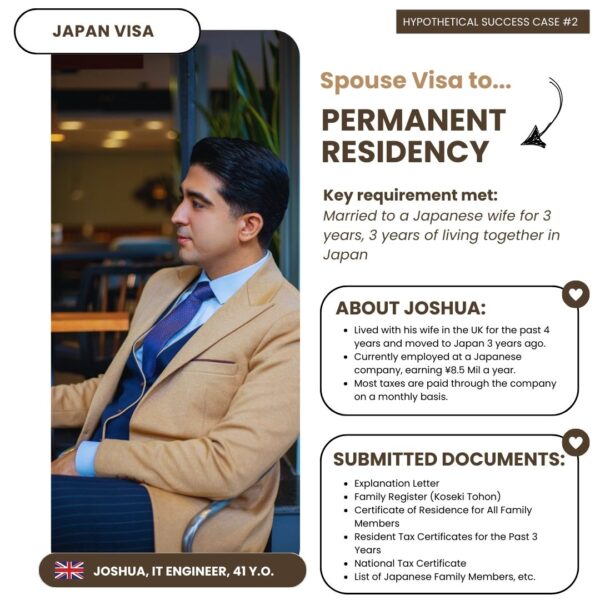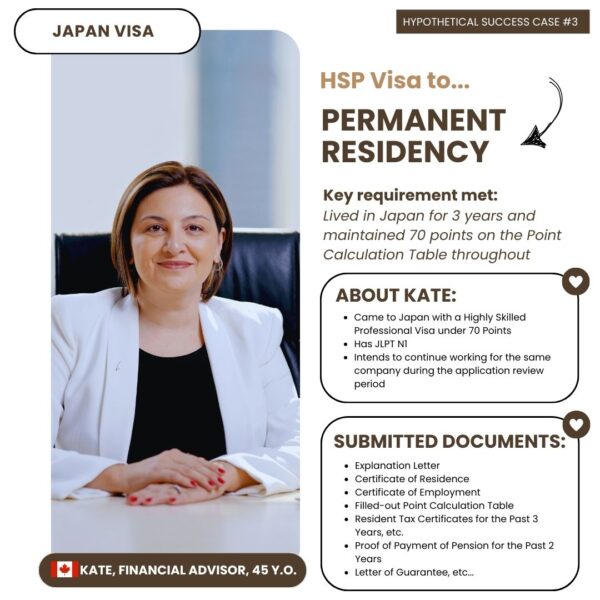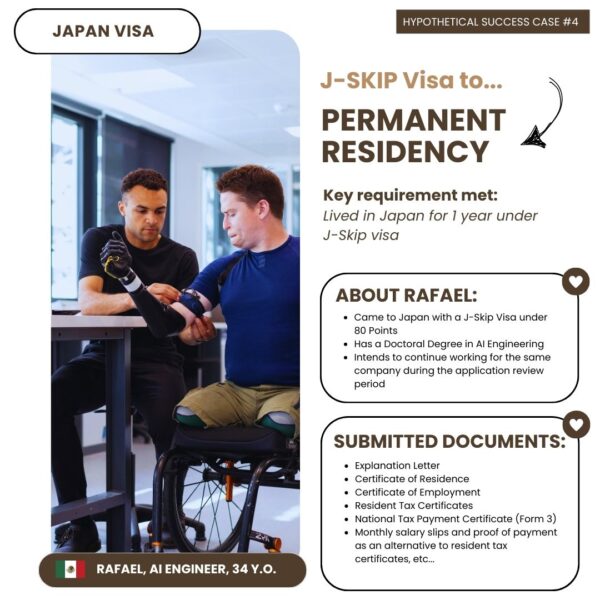#visa
Permanent Resident Visa
Step into a promising future in Japan with the help of our tailored permanent residency solutions.
Step into a promising future in Japan with the help of our tailored permanent residency solutions.


The standard requirement for a permanent resident visa is continuous residence in Japan for the past 10 years, with at least the last 5 years under an appropriate work visa or residency status.
PR status brings advantages like avoiding visa renewals and broadening the scope of activities you can engage in. On the flip side, there are disadvantages, such as tax implications, requiring you to pay taxes on your worldwide income.
The processing time for the Permanent Resident Visa is notably lengthy, and recently it is taking 1 year and 6 months on average.
You still need to renew your Permanent Resident Visa card every 7 years and ensure that you have an re-entry permit (including a ‘Minashi’ re-entry permit) when you leave Japan.
Here, we will introduce five main scenarios for obtaining a Permanent Resident Visa in Japan. Let’s go through each one.
If you have been residing in Japan for the past 10 years, with at least 5 years spent under a working visa (excluding Technical Intern Training Visa and Specific Skilled Worker (i) Visa), you meet one of the most difficult requirement for the standard path.
Here is a hypothetical case of Luna, a digital marketer working in Tokyo, earning an annual salary of 5 million yen.

She has been living in Japan for the past 10 years, six of which were under a Humanities Visa while working for the same Japanese company.
She has paid all her taxes, pension, and health insurance through her company, so these were always paid on time. Assuming she can submit all the required evidence, she will be eligible for a Permanent Resident Visa.
If you are the spouse of a Japanese national or Permanent Resident and have been married for more than three years, with at least one year of residence in Japan, you may be eligible for the shorter track to apply for PR without meeting the standard requirement.
You, however, must have at least a three-year period of stay on your residence card, so in practice, you may need more than one year of residence in Japan.
Here, Joshua, a hypothetical character from Britain, has been married to a Japanese wife for four years and moved to Japan three years ago.

He works for a Japanese company, and the couple has a sufficient household income as well as ¥5 million in savings. Their relationship is strong, and they have lived together throughout their marriage.
In his most recent renewal, he finally received a three-year period of stay instead of one year. Now, he can apply for PR with all the required documents, including tax certificates, the family register, and more.
If you have a Highly Skilled Professional visa, it means you had 70–80 points under the Point Calculation Table when you applied for your current visa.
The Point System awards points based on factors such as educational background, work experience, annual income, age, and Japanese language proficiency. This visa type is granted to individuals who met the required points at the time of their application.
For Highly Skilled Professional visa holders, the standard requirement of 10 years in Japan and 5 years under a work visa is relaxed as follows:
Those who have maintained 70 points for the past 3 years are eligible for PR after 3 years of residency, while those with 80 points or more for at least 1 year qualify after just 1 year of residency.
Let’s have a look at a hypothetical case of Kate, a financial advisor, who has a Highly Skilled Professional visa has maintained her 70 points since 3 years ago, and is ready to submit PR application.

She can also prove that she has maintained her points by submitting her current certificate of employment. Additionally, all her tax payments have been submitted without any issues.
She has also expressed her love for Japanese culture, as well as her professional connections in Tokyo as a financial advisor, which she highlights in her statement.
J-Skip visas are granted to ‘Specially Highly Skilled Professionals,’ and if you have a J-Skip visa, you are on the fastest 1-year track to Permanent Residency in Japan.
Note that you are expected to maintain this situation throughout the review period, which is currently taking around 1 year and a half.

In the case of Rafael, an AI engineer, he still needs to submit a national tax payment certificate and resident tax certificates, but he only needs to submit documents for one year.
If you are a long-term resident who has been residing in Japan for 5 years, you will also have the option to apply for Permanent Residency with relaxed requirements.
Throughout these specified periods, other requirements must still be fulfilled, such as the prompt payment of taxes, health insurance, and pensions.
Here is a list of requirements for the Permanent Resident Visa:
Now, what does each of these items mean? We have broken them down for you so it’s easy to digest. Let’s go through the requirements one by one.
To qualify for Permanent Resident status in Japan, maintaining an exemplary record is essential. This includes a clean criminal history, consistent tax payments, and adherence to other legal obligations.
You will need to show that you can independently support yourself in Japan, typically through stable employment and sufficient savings to cover living expenses.
At Small Seasons, we generally see if our clients have a minimum average household income of 200,000 to 250,000 yen. If you have children, this amount may be higher, as it depends on factors such as family structure, where you live, and the average cost of living in your area
It is important to meet the requirements of your current visa. For example, work visa holders must continue to be employed in a job that matches their visa type, while spouses of Japanese nationals must maintain a stable marriage.
The standard requirement is that you must have lived in Japan continuously for at least 10 years, with at least 5 years spent under a work visa or another visa based on family status.
Additionally, if, in the past 10 years, you lived outside Japan for more than 6 months in a single year or for 90 consecutive days, it is highly likely that immigration will consider this as not meeting the continuous residency requirement.
Currently, your visa should allow you to stay in Japan for the longest possible period. The immigration bureau has announced that, for the time being, a stay of up to 3 years can be considered the ‘maximum duration of stay,’ as stated in their announcement.
Consistently fulfilling tax obligations and contributing to the Japanese social security system without missing deadlines is essential.
If you are still in the planning phase for your permanent residency, we recommend setting up automatic bank withdrawals, or if possible, paying your taxes in full in advance to avoid the risk of delays.
They will check whether you have promptly submitted any necessary notifications, such as updates regarding your employer or changes in your company address, to the Immigration Bureau.
To apply for a Permanent Resident Visa, you must secure a guarantor, either a Japanese national or a Permanent Resident Visa holder.
The guarantor assumes a moral obligation, not a legal one, and will not be held legally accountable for your actions or fees.
It is preferable for your guarantor to be a Japanese national who is currently employed.
The list of required documents varies depending on your current visa status. To obtain a customized list for your specific case, we recommend consulting with an immigration lawyer, but here is a general list for your reference to help you understand the basic requirements.
Advantages of Permanent Resident Visa:
The major advantage is that you no longer need to renew your visa. With a Permanent Resident Visa, you can enjoy the freedom to stay in Japan indefinitely without the hassle of renewal applications, although it’s essential to be aware that deportation remains a possibility in the case of committing a crime.
Life happens, but your stay in Japan remains constant. Even in the face of a spouse’s passing or divorce, your Permanent Resident status ensures you can stay in Japan, providing peace of mind during challenging times.
As a Permanent Resident, you have the flexibility to engage in various activities without visa-related restrictions. There are no limitations on the types of jobs you can undertake, allowing you to participate in any occupation legally.
Holding a Permanent Resident Visa can significantly improve your financial standing by making it easier for you to obtain loans from banks. You will find it easier to access financial support for personal or entrepreneurial endeavors
Disadvantages of Permanent Resident Visa:
Over time, you may be required to pay taxes not only on your income in Japan but also on your global income. This could result in a higher tax bill, particularly if you possess significant income from overseas. Make sure to consult with your tax accountant for details.
Exit tax is applied to valuable financial assets, both within Japan and overseas, upon your permanent departure from Japan. Permanent Resident Visa holders may be subject to this tax, leading to potential financial implications, especially if you possess substantial assets.
Attaining Permanent Resident Visa may render you ineligible for the parental accompaniment system. This change could impact high-skilled foreign workers with children under specific conditions, influencing their family’s immigration status.
The processing time for a Permanent Resident Visa application is typically 6-8 months, with instances where it could extend up to one year or even longer.
As the application review period is currently lengthening, we strongly recommend consulting with your immigration lawyer at the earliest opportunity.

At Small Seasons & Co., we specialize in visa application support and business setup services for foreign nationals. Our team is fully bilingual and proficient, ensuring a seamless and efficient handling of your case.
